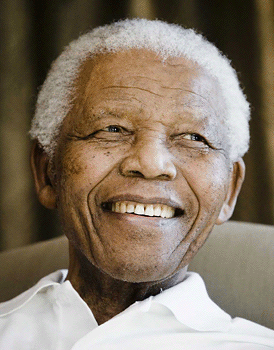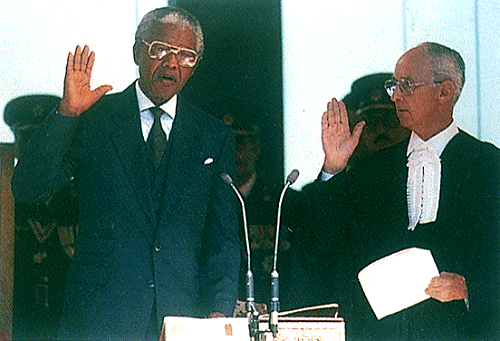Mandela Memorial Service Draws World Leaders
Tuesday, December 10th, 2013December 10, 2013
Dozens of world leaders joined tens of thousands of South Africans to pay tribute to the late Nelson Mandela at a national memorial service in Johannesburg. The former South African president, a key figure in ending apartheid in South Africa and the first black president of that country, died on December 5 at age 95. Delivering a eulogy in a driving rain, United States President Barack Obama described Mandela as a “giant of history” who was the last great liberator of the 20th Century. “It took a man like Madiba to free not just the prisoner, but the jailer as well; to show that you must trust others so that they may trust you,” declared President Obama, to a standing ovation. (Madiba is Mr. Mandela’s clan name.)
In a second eulogy, United Nations Secretary General Ban Ki-moon emphasized Nelson Mandela’s ability to forgive: “He showed the awesome power of forgiveness–and of connecting people with each other and with the true meaning of peace. That was his unique gift–and that was the lesson he shared with all humankind.”

Nelson Mandela was the first black president of South Africa. He had long been a major figure in the struggle for racial justice. (AP Photo)
The service, held at a vast soccer stadium, was attended by at least 90 current or former heads of state or government, perhaps the largest such gathering in history. The United States was represented by President and Mrs. Obama as well as by former presidents Jimmy Carter, Bill Clinton, and George W. Bush. Toward the end of the service, President Obama shook hands with Cuban President Raul Castro, brother of Fidel Castro, a long-time American adversary. Political experts note that the gesture will likely stir much comment, both on the left and the right.
Nelson Mandela’s remains are to lie in state in Pretoria, South Africa’s executive capital, for three days. The funeral will take place on December 15 in his remote boyhood village of Qunu in the Eastern Cape region.
Other World Book articles:
Other sites or videos of interest:



